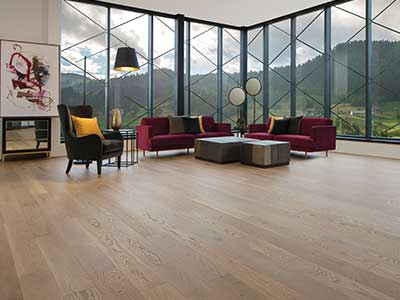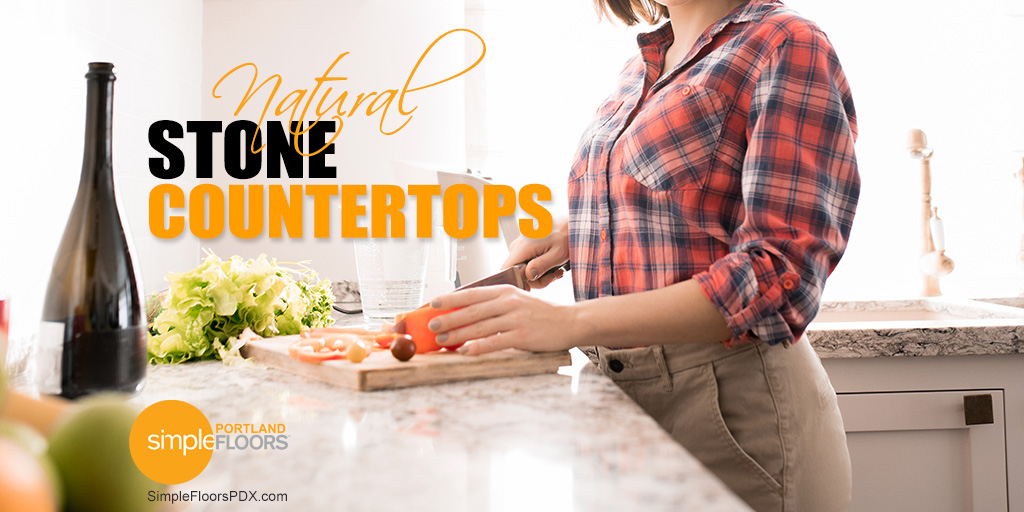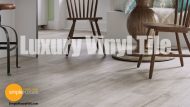If you want your countertop to be as individual as you are, then look into a natural stone countertop. Natural stone is quarried and is often limited in size. For example, limestone is limited to seven-foot slabs. So if your counter is longer than the natural stone slab, you will have a seam. It’s not a bad thing. It’s just different than what you would get with a manufactured countertop that’s built to size.
Your countertop needs to handle a lot and it’s best to invest in one that looks great and makes you feel good. Your kitchen counter is where you prep meals, store small appliances and lean against when you’re chatting about your day with your partner.
Colors and trends come and go (Remember avocado green tile? We’re still trying to forget it) so think and plan your counter carefully. Today’s Pantone grey and yellow may be the popular hot colors, but how will you like it in a few years, or a better question might be, how will a potential buyer of your home 5-10 years from now like it? It’s best to get something fairly neutral that will work with your flooring selection, yet can be jazzed up with towels, decor, and wall tiles.
Natural stone may appear to be fairly neutral, but on closer inspection, you’ll see it comes alive with different shades and textures.
Types Of Natural Stone For Countertops
The four best types of natural stone for kitchen and bathroom countertops are limestone, Jerusalem stone, soapstone, and slate. Let’s look at each in detail.
Limestone Counters
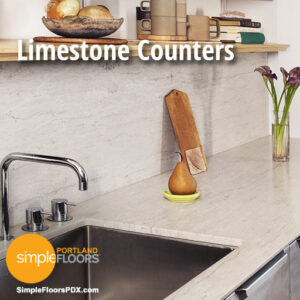 Limestone is formed from sedimentary stone comprised of calcium deposits. It is heat resistant if you have to put something hot down without a pad or trivet. While it can scratch more easily than the other natural stones, it is easy to buff out.
Limestone is formed from sedimentary stone comprised of calcium deposits. It is heat resistant if you have to put something hot down without a pad or trivet. While it can scratch more easily than the other natural stones, it is easy to buff out.
Limestone has the most variety of colors ranging in the neutral range. It can be white, ivory, gray, red, and yellow with more colors in between. It is somewhat porous and needs to be re-sealed regularly and maintained with a coating of mineral oil.
Jerusalem Stone Countertops
Jerusalem stone is actually more durable than granite. It’s a type of limestone that’s extremely dense and resistant to weathering. It is usually a golden shade or a taupe-grey color. The stone is somewhat porous and needs to be re-sealed regularly and maintained with mineral oil.
Soapstone Counter Tops
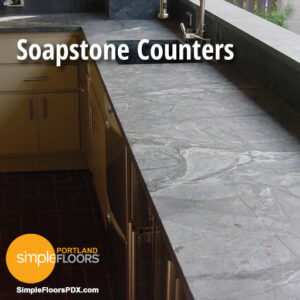 Soapstone is fairly hard and is heat resistant. It’s formed from metamorphic talc that is compressed. It’s called soapstone because some people feel the stone feels like soap when held.
Soapstone is fairly hard and is heat resistant. It’s formed from metamorphic talc that is compressed. It’s called soapstone because some people feel the stone feels like soap when held.
Small scratches can be sanded out and then coated with mineral oil. Sandstone is usually dark grey or green yet it is a warm feel. The color and style work well with a variety of kitchen designs.
Soapstone is one of the best materials for kitchen and bathroom counters because it is non-porous and stain-resistant. It’s easy to keep clean and sanitary since no bacteria can get trapped in any cracks or seams. And soapstone doesn’t require periodic sealing.
Over time, the soapstone takes on an antique patina that works well with retro and country-style kitchens. Like other natural stone counters, you do need to treat it regularly with mineral oil.
Slate Counters
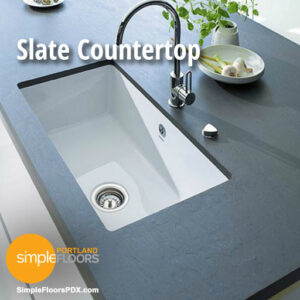 Slate is a dense metamorphic rock produced by the compression of clay and ash sediments. Like Soapstone, it’s non-porous and doesn’t require being re-sealed periodically. But some people prefer to seal their slate counters regularly to make it easier to clean.
Slate is a dense metamorphic rock produced by the compression of clay and ash sediments. Like Soapstone, it’s non-porous and doesn’t require being re-sealed periodically. But some people prefer to seal their slate counters regularly to make it easier to clean.
The grey color ranges from dark to light grey. You can also find blue, green, red, purple, brown, and black slate. It’s one of the few stone counters that’s naturally matte if you don’t want a shiny polished counter. It’s very durable and heat-resistant. Spills wipe up easily with no staining. And it’s naturally anti-microbial.
While some people do use mineral oil on their slate countertops, it’s not necessary unless you want a slight sheen.
But What About Granite And Marble
Granite and marble are lovely for natural stone counters and they are extremely popular. They provide a different look than other natural stone and are often the default terms that people use when referring to stone counters.
Marble and granite are very durable and heat resistant up to around 480F. Granite is formed from igneous rock which endures extreme heat and then cooling. Marble is like soapstone and formed by metamorphic minerals.
We wanted to focus on natural stone slabs as a different look for you to consider for your home however, if you’re interested in granite and marble, you can contact us for even more options.
Why Natural Stone Is Great for Counters
Natural stone is beautiful and enhances any home. Plus, no one else is going to have anything like yours. Stone is like flowers and snowflakes – no two are the same. If you’re looking to resell your home soon, natural stone has the highest resale value.
The natural stone is environmentally sustainable and doesn’t produce any negative byproducts. It ages well although the color may darken over time.
What You Should Be Aware of When Choosing Natural Stone
Here are some additional points to be aware of when you are going to select a natural stone for your kitchen or bathroom:
1- Natural stone is heavy. If you have long counters, you will need to have a professional determine if it needs to be structurally reinforced.
2- You can work with a home designer and mix natural stone with tile or engineered stone for a personalized look.
3- Natural stone can chip if it’s hit at the right angle with the right amount of force. Generally speaking, it’s not going to under normal wear and tear.
4- If you do somehow get a chip in your natural stone counter, you can get it repaired easily while still keeping the surface flat and smooth, however it may be expensive.
Should You Get Natural Stone Counters?
If you’re looking for a counter that is eco-friendly and one-of-a-kind, you should talk to a home designer and see which natural stone is best for you and your lifestyle. Natural stone is heat resistant and stain resistant and provides warmth inside that other countertop materials may not.
And don’t forget your bathrooms. Natural stone is a great counter in bathrooms as it’s water-resistant and easy to clean.

